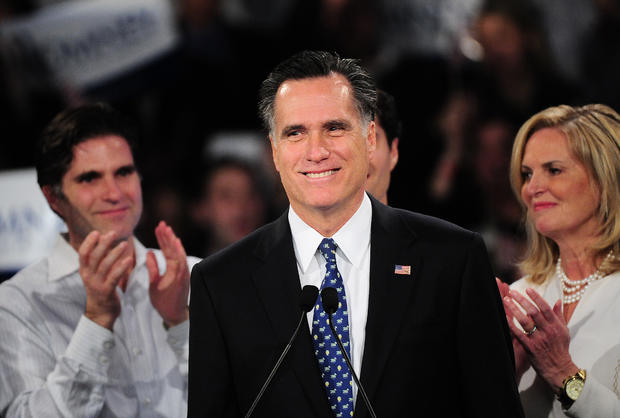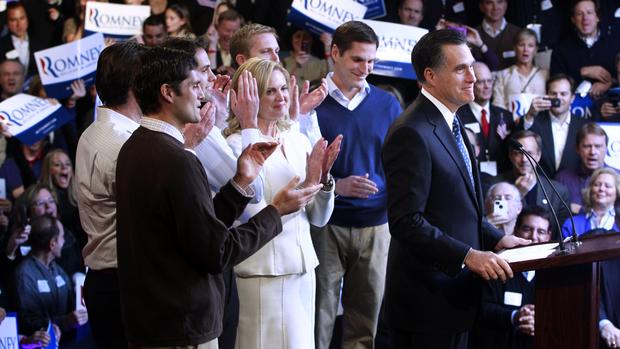After New Hampshire primary win, all is not rosy for Mitt Romney
Updated 11:30 p.m. ET
On its face, it looked like a great night Tuesday for Mitt Romney. He won a decisive victory in the New Hampshire GOP primary, defeating his rivals by more than fifteen points. Examining the CBS News poll of exiting voters, though, reveals a number of worrisome signs for Romney among core groups in the electorate, which if not reversed could spell trouble for him as the campaign progresses.
Republicans Don't Love Him
Candidate enthusiasm is a key antecedent of electoral success. Whichever nominee generates the most excitement among its base typically has an easier time getting their supporters to the polls and ultimately securing more votes. When President Obama won the presidential election in 2008, he had more than twice as many voters excited about him becoming president than his Republican counterpart John McCain.
At this point in the campaign, Republican voters are not thrilled with the idea of Romney becoming the Republican presidential nominee. Nearly a third of self-indentified Republicans in the New Hampshire GOP primary would be dissatisfied if he were fronting the ticket. Of the Republicans who are dissatisfied with them, 60 percent are fiscal conservatives who want lower taxes and reduced federal spending.
Full New Hampshire primary results
New Hampshire Exit Poll
Republican Primary Election Center
Tea Partiers Can't Stand Him
In 2009, the Tea Party movement burst onto the political scene protesting taxes and budget deficits, and calling for steep reductions in government spending. Within a year, it had mobilized into a potent political force, whose endorsed candidates upset Republican incumbents in primaries across the country and won a number of Senate and House races in the 2010 Midterm elections. With their organization and energy, the Tea Party movement has the capacity to play an important role in the 2012 presidential race.
To this point, though, the Tea Party movement has wanted nothing to do with Romney. Judson Phillips, the founder of Tea Party Nation, endorsed Newt Gingrich. The Tea Party Fund created a website - NotMittRomney.com - to inform voter's of his liberal positions on key issues. And, Karen Martin, South Carolina Tea Party organizer said on National Public Radio recently that "no Tea Partier that I talk to in the state or nationally would want to promote Romney."
In the Iowa caucuses, Romney finished tied for fourth among strong supporters of the Tea Party movement, 14 points back of Rick Santorum. In New Hampshire, although he won a plurality of the vote among Republicans who strongly back the movement, he received noticeably less support than he did from Republicans who were less supportive of the movement.
Romney braces for a fight in South Carolina
Why Romney won in New Hampshire
Jon Huntsman survives, but for how much longer?
Low Income Men Can't Relate to Him
Low income, white men have long been an important part of the Republican base. Romney, though, has alienated many of them with comments during the campaign that were perceived as being insensitive. At a debate last month in Iowa, he tried to make a $10,000 wager with Rick Perry over how his health care plan was characterized in his book. This past week, he commented that he liked to "fire people" that provide services to him.
These gaffes are showing their impact at the polls. In the past two contests, Romney has done poorly among white men from households earning less than $50,000 annually. In the Iowa caucuses, he received less than 15 percent of their support. In the supposedly friendly confines of New Hampshire he did not fare much better. He received only 27 percent of the vote from low income, white men in New Hampshire, trailing Ron Paul by 11 points.
Independents Don't Support Him
Self-identified independents are a key swing group in presidential elections. Winning their support doesn't ensure electoral success, but losing it by a wide margin almost guarantees defeat. In 2008, Barack Obama defeated John McCain among independents 52 percent to 44 percent on his way to winning the presidency.
Despite all his success in the nomination campaign, Romney has been unable to attract much support from independents. In Iowa, Paul crushed Romney among self-identified independents, besting him 43 percent to 19 percent. Things improved in New Hampshire, but on a night, in which Romney won most demographic groups, he managed to lose independents again. Paul beat Romney 32 percent to 29 percent.
Romney's weakness among independents appears to stem from views about how to solve the federal budget deficit, likely to be a major issue in the fall campaign. Among independent voters in the New Hampshire GOP primary who thought the deficit was the most important issue, they supported Paul over Romney by a whopping 48 percent to 23 percent margin.
Poll results discussed in this article are based on a National Election Pool entrance poll conducted by Edison Media Research. Interviews were conducted with 2760 primary voters as they exited precincts around New Hampshire. The margin of error for the poll is +/-4 percentage points.
Full CBS News coverage: Mitt Romney
Full coverage: Campaign 2012

